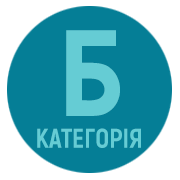ПОЗИТИВНА ПСИХОТЕРАПІЯ ТА МЕТОДОЛОГІЯ MGS У ОРГАНІЗАЦІЇ ТА ПРОВЕДЕННІ ПСИХОСОЦІАЛЬНИХ ТА ТРАДИЦІЙНИХ ІГОР ЯК ДОДАТКОВИХ ІНСТРУМЕНТІВ ГРУПОВОЇ ТЕРАПІЇ, КОНСУЛЬТУВАННЯ ТА КОУЧИНГУ ДІТЕЙ, ЯКІ ЗУСТРІЛИСЬ З ВІЙНОЮ
DOI:
https://doi.org/10.32782/psyspu/2023.1.3Ключові слова:
позитивна психотерапія, п’ятикрокова модель позитивної психотерапії (PPT), методологія MGS (рух, гра, спорт), кризова психологія, кризова педагогіка, стресові воєнні фактори та симптоми, психосоціальні та традиційні ігри, групова психотерапіяАнотація
У статті висвітлено статистичні дані демографічної ситуації внутрішньо і зовнішньо переміщених унаслідок воєнних дій українців та втрат. Подано аналіз наслідків військових дій та травматичного досвіду дітей в умовах війни. Проаналізовано можливості інтеграції досвіду європейської психологічної, психотерапевтичної практики до використання в роботі з травматичним досвідом дітей українськими психологами. Обґрунтовано методологію E. Parruca щодо поєднання інструментів позитивної психотерапії (PPT) та MGS (рух, гра, спорт) у організації та проведенні психосоціальних та традиційних ігор як додаткових інструментів групової терапії, консультуванні та коучингу дітей, які зустрілись з війною. Розкрито механізми виявлення актуальних, внутрішніх та базових конфліктів та подальшого розвитку первинних і вторинних здібностей у підході позитивної психотерапії. Описано запропоновану E. Parruca методологію поєднання 5-крокової моделі консультування позитивної психотерапії і MGS методології у груповій роботі з дітьми. Охарактеризовано етапи 5-крокової моделі консультування PPT: спостереження та дистанціювання, проведення інвентаризації, ситуативне заохочення, вербалізація, розширення цілей і етапи за методологією MGS: розминка, основна частина, розслаблення, підсумковий відгук.
Посилання
Bürgin D., Anagnostopoulos D., the Board and Policy Division of ESCAP. et al. Impact of war and forced displacement on children’s mental health – multilevel, needs-oriented, and trauma-informed approaches. Eur Child Adolesc Psychiatry, 2022. 31, 845–853. URL: https://doi.org/10.1007/s00787-022-01974-z.
Cohen E., Chazan S., Lerner M., Maimon E. Posttraumatic play in young children exposed to terrorism: an empirical study. Infant Mental Health J: Off Publ World Assoc Infant Mental Health. 2010. 31(2):159–181. URL: https://doi.org/10.1002/imhj.20250.
De Jong, J. et al. Trauma, War and Violence: Public mental health in socio-economic context. New York, Boston, Dordrecht, London : Kluwer Academic Press. 2002.
Feldman R., Vengrober A. Posttraumatic stress disorder in infants and young children exposed to war-related trauma. J Am Acad Child Adolesc Psychiatry. 2011. 50(7):645–658. URL: https://doi.org/10.1016/j.jaac.2011.03.001.
Improving children’s wellbeing: An evaluation of NRC’s Better Learning Programme in Palestine January. Norwegian Refugee Council. Author of report: Dr. Ritesh Shah, Faculty of Education and Social Work, University of Auckland. 2017.
Joshi P.T. and Deborah O’Donnell. Consequences of child exposure to war and terrorism. Clinical Child and Family Psychology Review. 2003. 6(4):279–291.
Karatzias,T., Shevlin M. War exposure, posttraumatic stress disorder, and complex posttraumatic stress disorder among parents living in Ukraine during the war. 2023. URL: https://doi.org/10.1111/acps.13529.
Kovalenko N. Transcultural solutions in shaping the readiness of future teachers to interact with children who have encountered war. In search of truth and humanity in the age of war : materials of International Scientific and Training Conference entitled (August 21–26, 2022). Leszno, Poland. 2022.
Kovalenko N.V. The content of the training program for preparing the future teacher to work with children who faced the war. Педагогічні науки: теорія, історія, інноваційні технології, 2022. 7–8 (120): 190–201.
Norwegian Refugee Council. Better Learning Programme 1: Supporting Students’ Recovery in Emergencies, Classroom Sessions. Department of Education, University of Tromsø & Norwegian Refugee Council, Oslo, Norway. 2019.
Parruca E. Positive Psychotherapy embracing MGS Methodology: Psychosocial & traditional games as complementary tools in group therapy, counselling and coaching. 2013.
Pastoor L.d.W. Refugees Well School Intervention Manual: In-Service Teacher Training (INSETT) Psychosocial support to young refugees. Working Paper, 20.02.2019. Oslo : Norwegian Centre for Violence and Traumatic Stress Studies. 2019.
Peseschkian, N. Positive Psychotherapy: Theory and Practice of a New Method. Springer-Verlag Berlin Heidelberg, Germany, 1987. Pp. 271–273; 413–430.
Ritesh Shah. Improving children’s wellbeing: An evaluation of NRC’s Better Learning Programme in Palestine. Norwegian Refugee Council, Oslo, Norway. 2017.
See MOVE Project, founded by UEFA. 2012. URL: http://tdh-childprotection.org/projects/move/description.
Slone M., Mann S. Effects of war, terrorism and armed conflict on young children: a systematic review. Child Psychiatry Hum Dev. 2016. 47(6):950–965. URL: https://doi.org/10.1007/s10578-016-0626-7.
Smith D. Children in the heat of war. APA Monitor. 2001. 32(8):29.
UN Women. Rapid gender analysis of Ukraine: Secondary data review, March 31 2022. URL: https://www.unwomen.org/en/digital-library/publication (дата звернення: 27.08.2022).
United Nations Refugee Agency. IDB Ukraine. URL: https://www.unhcr.org/ua/en/internally-displacedpersons#:~: text=Some%207%20million%20people%20have,to%20find%20safety%20and%20accommodation (дата звернення: 08.01.2022).
World Health Organization. Regional Office for Europe. Health needs assessment of the adult population in Ukraine: survey report September 2022. World Health Organization. Regional Office for Europe. 2023 . URL: https://apps.who.int/iris/handle/10665/365564.







